- News
- Reviews
- Bikes
- Accessories
- Accessories - misc
- Computer mounts
- Bags
- Bar ends
- Bike bags & cases
- Bottle cages
- Bottles
- Cameras
- Car racks
- Child seats
- Computers
- Glasses
- GPS units
- Helmets
- Lights - front
- Lights - rear
- Lights - sets
- Locks
- Mirrors
- Mudguards
- Racks
- Pumps & CO2 inflators
- Puncture kits
- Reflectives
- Smart watches
- Stands and racks
- Trailers
- Clothing
- Components
- Bar tape & grips
- Bottom brackets
- Brake & gear cables
- Brake & STI levers
- Brake pads & spares
- Brakes
- Cassettes & freewheels
- Chains
- Chainsets & chainrings
- Derailleurs - front
- Derailleurs - rear
- Forks
- Gear levers & shifters
- Groupsets
- Handlebars & extensions
- Headsets
- Hubs
- Inner tubes
- Pedals
- Quick releases & skewers
- Saddles
- Seatposts
- Stems
- Wheels
- Tyres
- Health, fitness and nutrition
- Tools and workshop
- Miscellaneous
- Buyers Guides
- Features
- Forum
- Recommends
- Podcast
feature
 10 of the best British bike brands of the 70s and 80s Jan 2022
10 of the best British bike brands of the 70s and 80s Jan 202210 of the best British bike brands of the ‘70s and ‘80s: featuring Raleigh, Harry Quinn, Carlton, Holdsworth + more
Although the 1970s marked the beginning of many major bike brands starting to outsource production to Asia, it took a little longer for the transformation to fully take hold. Back then and well into the '80s was still the era of steel, which meant there were countless British bike brands designing and manufacturing in the UK.
> Best British bike brands - 11 UK outfits that make top quality bikes and gear
50 years ago, British-made and badged bikes were very much on top of their game on home turf. There were foreign brands available, with Peugeot being particularly prominent, and limited numbers of higher-end Italian and other European frames were also slowly coming through. Even so, most serious riders went for custom or handmade frames from UK makers and built them up to personal spec. There was also a growing market for quality, ready-assembled bikes in the UK.
> Retro vs modern: comparing a vintage steel racer with a modern machine
There were far more fully British bike brands around in those days, and many popular regional frame builders too. Here are a few brands that were particularly popular with British cyclists in the '70s and '80s…
Raleigh
During the '70s and '80s, Raleigh were very much the major bike manufacturer in the UK, and arguably in the world. The long established brand oozed practical quality, which was something of an image handicap for them when trying to also sell thoroughbred racing bikes.
Their SBDU/Special Products Division was the envy of the bike industry during that era, and produced the bikes for their famous TI Raleigh team, and they also continued to produce top end bikes for many years afterwards.
Several company takeovers and the trend towards overseas manufacturing pretty well left Raleigh on the sidelines during the 1990s. The brand is still very much in business, but the days when a boy racer would have lusted after a Raleigh Team Professional bike are long gone, sadly.
Carlton
Nottingham-based Carlton Cycles were a major brand during the 1950s. They sponsored numerous teams and top riders for many years, including Tom Simpson who won an Olympic bronze medal on the track atop of a Carlton.
In the early 1960s they were bought by their near neighbours Raleigh, along with several other British bike brands. For some time they were branded as Raleigh-Carlton, and their most iconic model was the Carlton Flyer, versions of which many cyclists rode up until the brand stopped production in 1985.
Falcon Cycles
A major brand during the 70s and 80s, Falcon's top-end racing model was the San Remo. For many years it came with chrome lugs, was much sought after.
The company started out in the 1880s branded as Coventry, and then Coventry Eagle. Falcon was initially their line of race bikes, and in the 1950s the company was rebranded as Falcon. Various Falcon sponsored road teams appeared for decades, and included the likes of Barry Hoban, Albert Hitchen and Sid Barras. Unfortunately Falcon also suffered from far eastern outsourcing, and although they still trade as part of the major Tandem Group, their high-end days are long gone.
Over the years I had numerous Falcon race bikes, with the second being a Christmas present in 1979, a 24-inch framed Falcon Professional... a bike that I never did grow into!
Coventry Eagle/British Eagle
Coventry Eagle was originally a bicycle and motorbike company that went on to become Falcon. British Eagle was a brand name that came along much later, and was an associate company.
The brands were popular with mid-range options during the '80s, with British Eagle bikes mostly being produced in Newtown, Powys, where Barry Hoban was the marketing director. They also sponsored domestic pro road teams during the era, with riders like Phil Bayton riding in Coventry Eagle colours during the '80s.
The brand is now part of the Tandem Group company, and can sometimes be found on cheaper 'supermarket' bikes.
Dawes Cycles
Birmingham-based Dawes Cycles started out back in 1906, and remained a highly respected and quality-driven brand for many decades.
Dawes sponsored many pro teams over the years, right on into the mountain bike era. The brand was best known for the Galaxy touring bike, a long-standing classic that was sadly discontinued after 49 years back in November 2020. They were also well respected for their tandems, inducing their early Double Edge MTB tandems.
> 26 of the best steel road bikes and frames to take a look at
Unfortunately Dawes suffered the same fate as many other British brands, and were sold numerous times during the '80s and '90s, eventually ending up as another Tandem Group company with their bikes now being produced in the Far East.
Claud Butler
Claud Butler was a London-based cycle dealer and then frame builder. He started trading in 1928, going on to open a number of branches and building highly decoratively lugged frames.
The brand sponsored riders such as Reg Harris amongst others, but things went into decline during the Second World War. In 1957 the then thriving Holdsworth brand bought the company, which they owned until 1987 when Falcon bought both of them.
Claud Butler bikes were very popular during the Holdsworth era, even outselling their own brand bikes, and were a regular ride with club cyclists of the time. The brand still exists and sells low-spec, mass-produced models through current owners the Tandem Group.
Holdsworth
The Holdsworth brand began in the late 1920s when Sandy Holdsworth took over the London-based Ashlone Cycle Works. Soon after they started making their own frames and then also clothing, the latter under the name Holdsworthy.
Other premises were opened, and as they grew they became sponsors of a British pro road team, which included big names of the era such as Les West and Colin Lewis. Their iconic orange and blue bikes were a thing of great lust during the '70s and '80s. Holdsworth also bought out brands such as Claude Butler and Freddie Grub.
The bike part of the business was taken over by Elswick Hopper/Falcon in the mid- 80s, and was recently revived by Planet X who also sponsored a pro team in 2018. The riders were decked out in almost the exact same colours as their illustrious predecessors.
Harry Quinn
Harry Quinn frames were very much de rigeur, high-end northern builds of choice in the '70s and '80s. The Liverpool-based company was something of a Merseyside institution, with other members of the Quinn dynasty also opening bike shops and building frames. Their frames were used by many champions over the years, and even won the Milk Race and Word Professional Pursuit Championships with Colin Sturgess.
After Harry Quinn lost his sight in one eye, the business was taken over in 1977. After a while, the brand owners Falcon started using the name on their own produced bikes.
I think it was Christmas 1980 when I struck a deal with Santa for my Harry Quinn frame, although I‘ve never been sure if it was built by Falcon or not. I still own a repainted Harry Quinn track bike from from the '80s.
Viking
The Viking Cycle Company started out as a bike repair shop in Wolverhampton in 1908. They progressed to bike manufacturing, and then also moved into specialist 'lightweight' bikes, launching a team in the 1950s.
The company ceased trading in 1967, and the brand was acquired by an American duo who began producing bikes in Ireland under the Viking Cycles name. Things didn’t quite work out, and they eventually sold the name to Avocet in 200, and then to Indian behemoths Hero Cycles in 2015.
The Severn Valley was Viking's most desired bike of the '70s and '80s, and during that time the brand had a strong British professional team that included former UCI President Pat McQuaid and Keith Lambert, who raced in white jerseys with red stripes across their top. A very famous TV and radio presenter of the time was also a fan, with two of his Viking bikes snapped up at auction by the owner of Planet X back in 2012. Weeks later, the celebrity in question was posthumously exposed as one of the worst predatory sex offenders in British history. Oh for the power of hindsight...
Reynolds
They may not have made frames, but Reynolds tubing was what just about every high end British (and other) frame was made of for decades. Unless it carried those humble frame stickers, many bike racers would turn their noses up at other offerings.
The numbers 531 and 753 were like status symbols of frame building during the '70s and '80s, and even non-cyclists often boasted of owning a 531 frame to impress.
For many years they were part of the Tube Investments group with the likes of Raleigh and Sturmey-Archer, which didn’t turn out so well. Reynolds were acquired by an American company for a while after that, but a management buyout ensured ownership was returned to its roots in Birmingham, where they still innovate and produce some of the finest steel tubes in the world.
Go on then, who have we missed? Let us know in the comments, and do tell us about your memories of the brands we've mentioned if you're mature enough to have been a cyclist in the 70s and 80s!
Latest Comments
- BBB 29 min 30 sec ago
Inhumane system that now will be getting even worse.
- Bungle_52 3 hours 53 min ago
In case anyone missed it in yesterdays blog here are the two pevious articles. The second one contains the testimony from the driver....
- David9694 4 hours 2 min ago
The old role was appointed at the Mayor's pleasure; is in addition to the permanent staff of the Combined Authority. I'm not sure if Adam was an...
- WillPage 5 hours 27 min ago
Nothing says "welcoming environment" like uniformed thugs, umm I mean "security patrols " roaming the area.
- galibiervelo 6 hours 45 min ago
That is class news. Super bikes and vision. Bet there will be no stand at the Taiwan bike show next year! Big luck to all the team
- Destroyer666 7 hours 27 min ago
Pretty clearly stated several times in the text that the issue was not related just to his son. And besides, everybody watching the races could see...
- Rendel Harris 7 hours 43 min ago
All Fizik and Selle Italia saddles (though not all their other products) are made in Italy I believe, and their 3D printed models definitely are.
- chrisonabike 8 hours 9 min ago
If you're not on the road with a car, I bet its driver is much less likely to swerve into your space *. Because you're not "in the way"! (Any...
- mdavidford 8 hours 25 min ago
The problem with this argument, though, is that it's just not true....
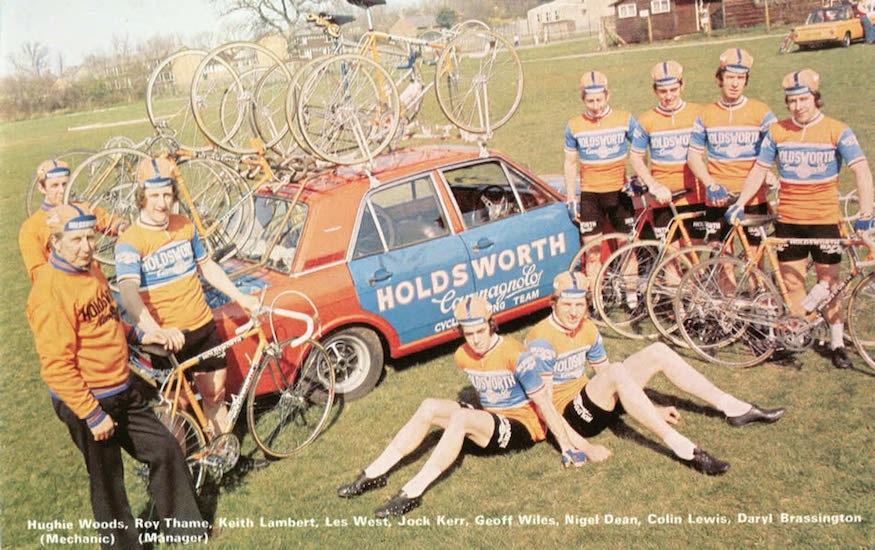
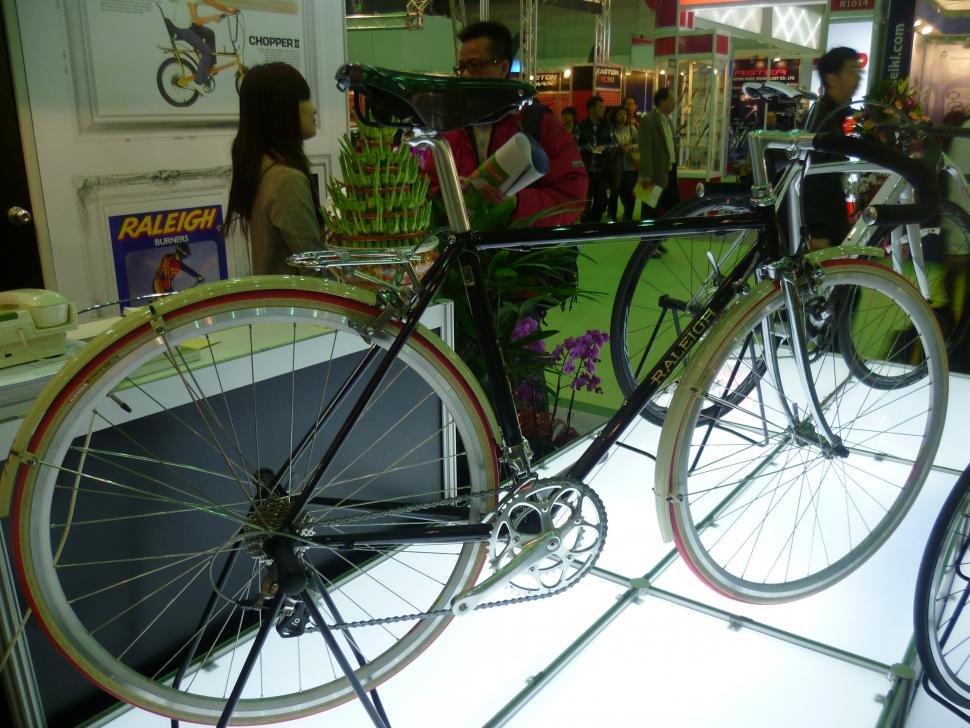
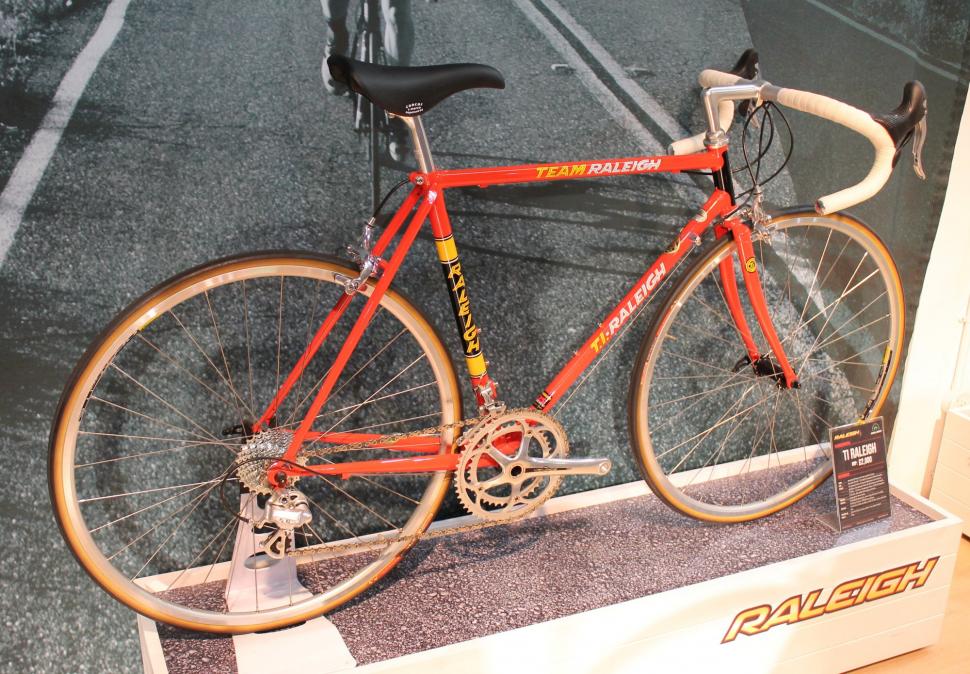
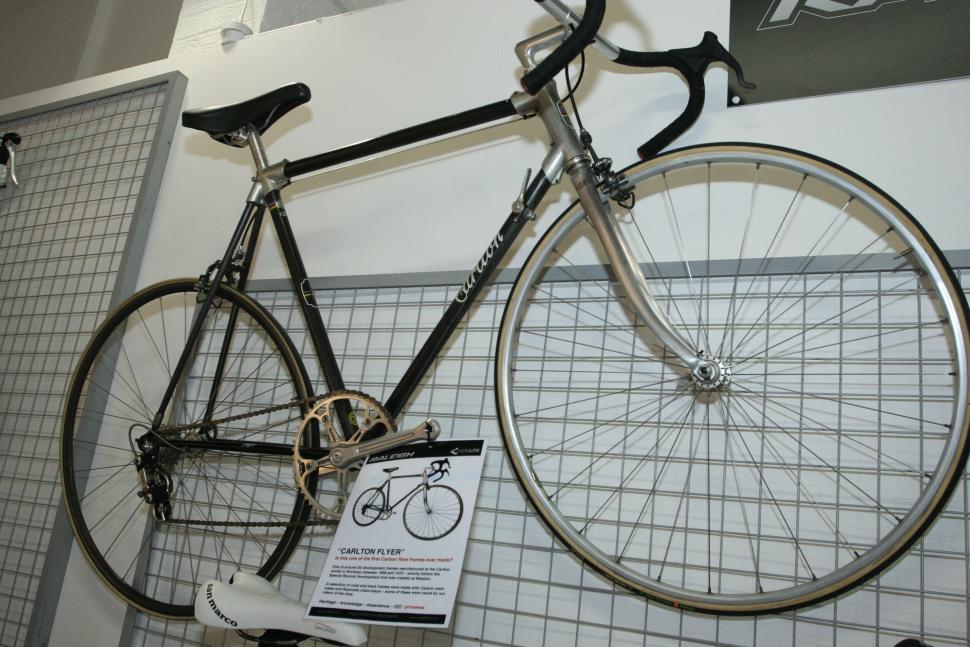
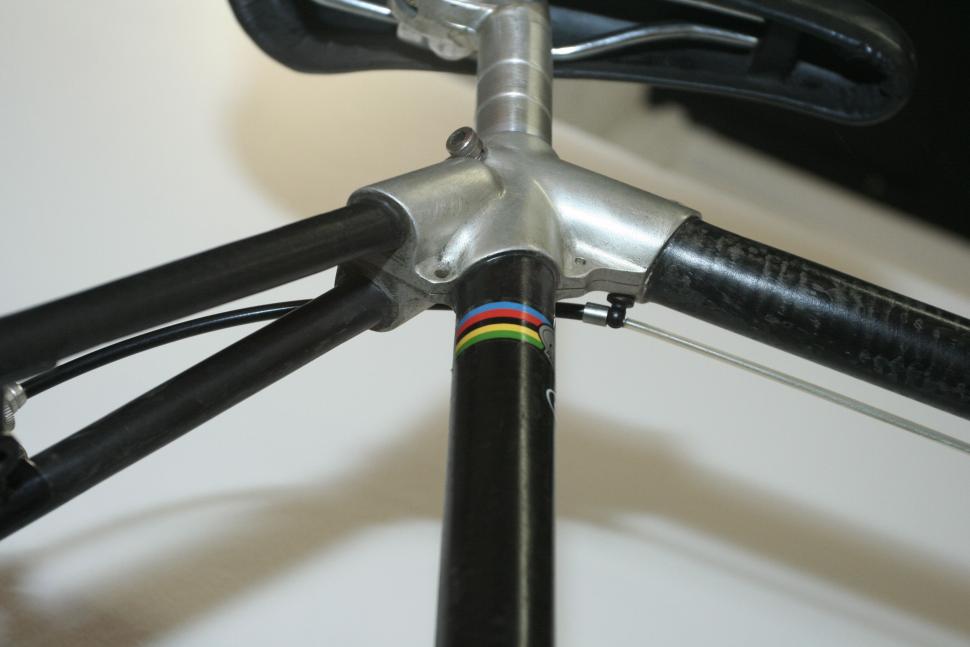
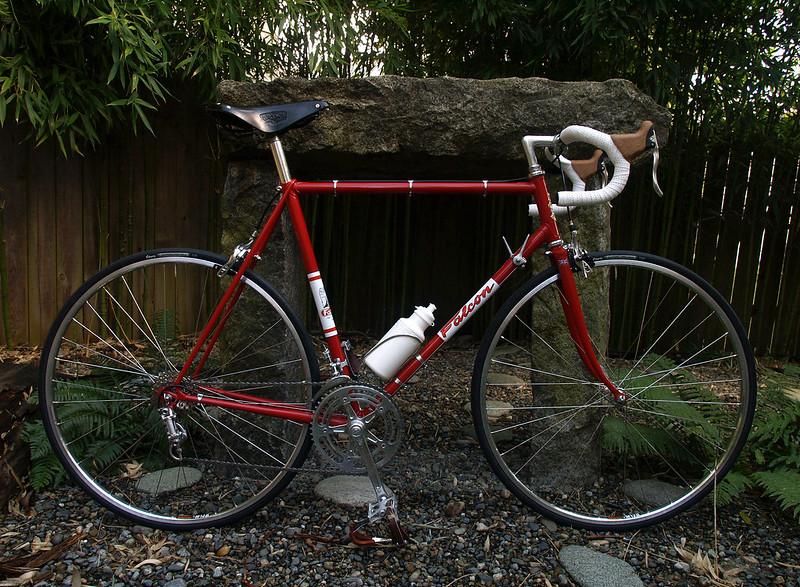
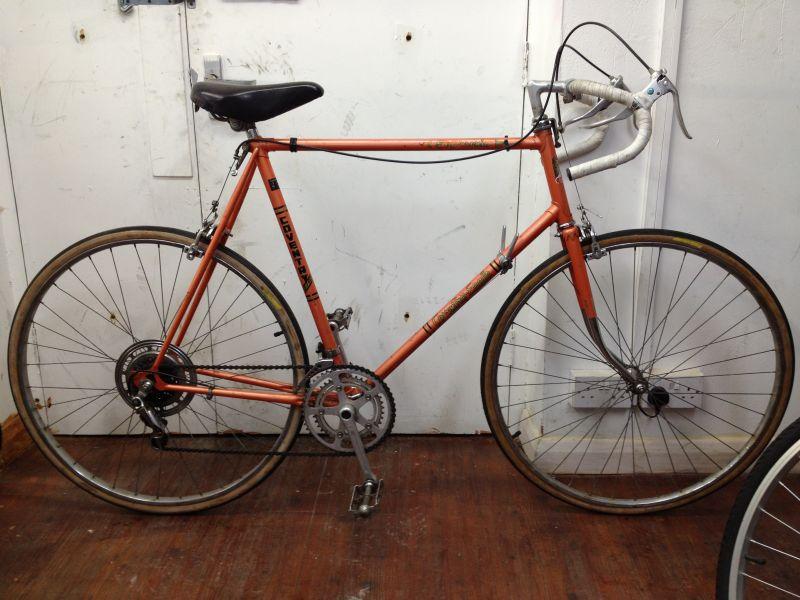
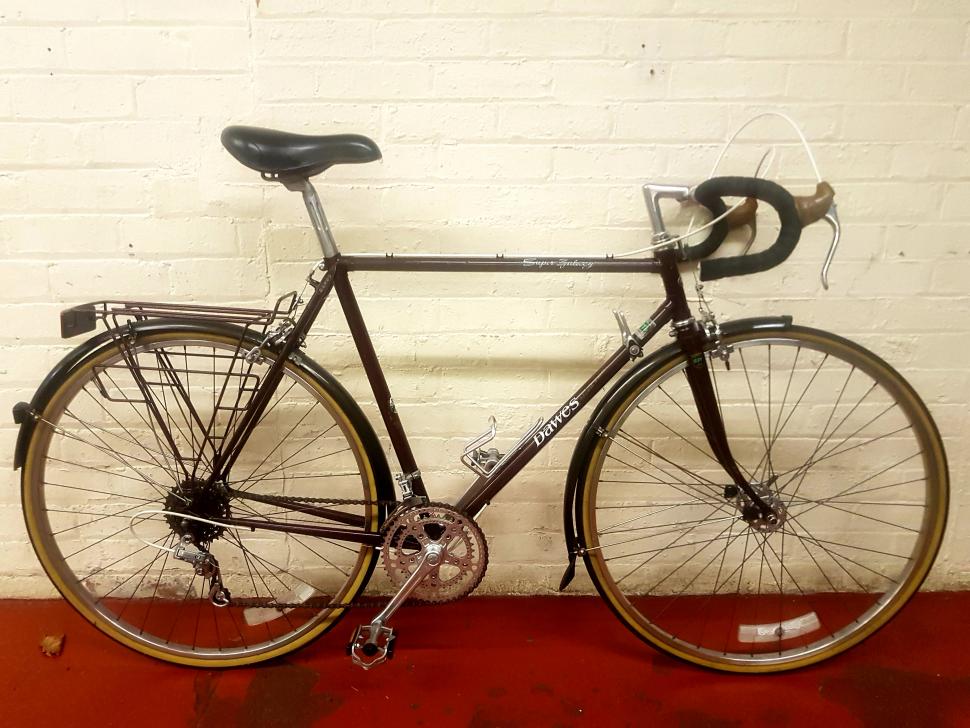
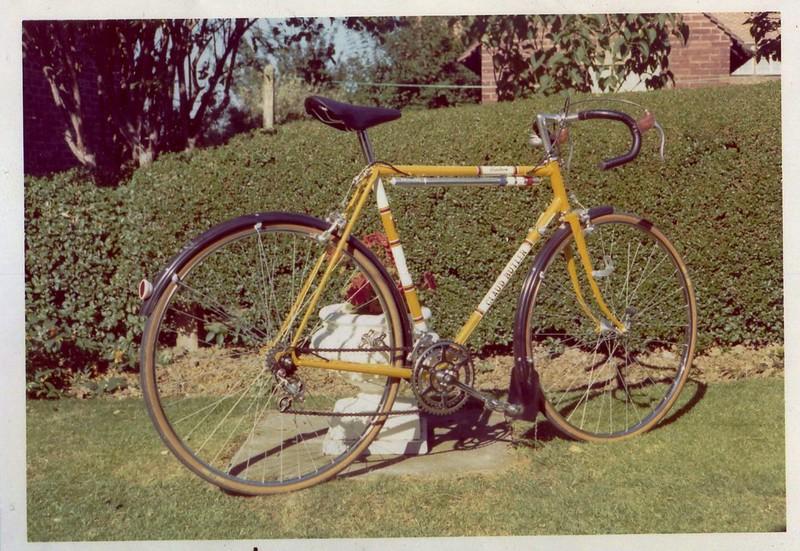

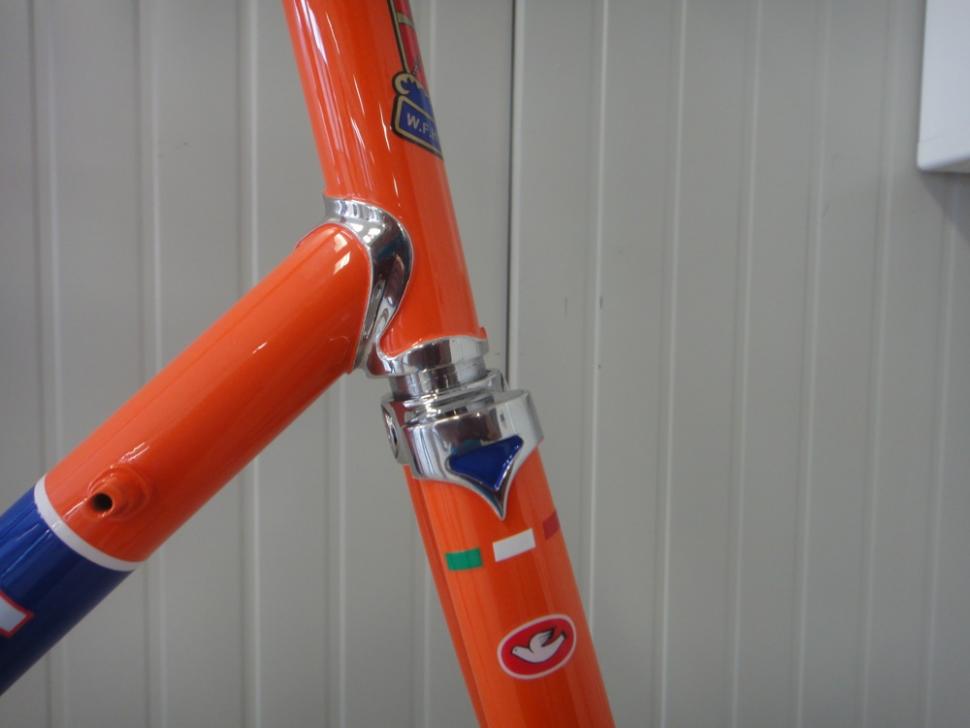
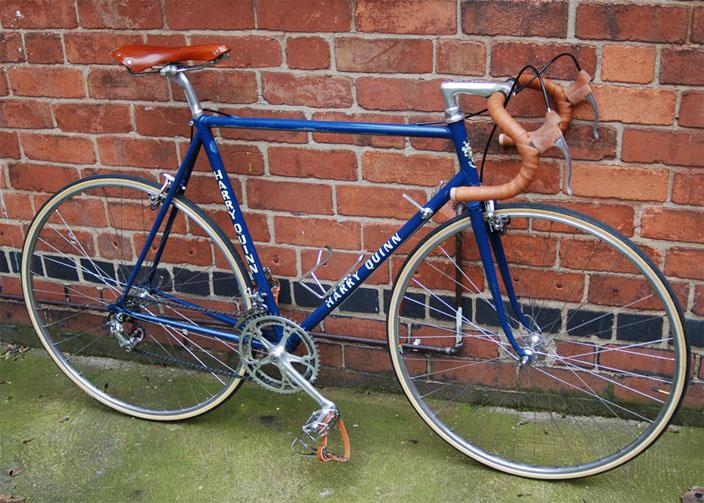



Add new comment
26 comments
Steve Thomas. Here is a few you might want to look at as this could help make part 2 of your article. If you mention Harry Quinn then you have to look at all of these who offered amazing bikes built to how you wanted it. There are many more but these are what came to mind. Harry Hall. Frank Herety. Ellis Briggs. Ken Bird. Geoffrey Butler. Bob Jackson. Neil Orrell. Johnny Berry. M Steel. J Waugh. Clive Stuart. F W Evans. Brian Rourke. M Stallard.Witcomb.
Jack Taylor. Hand made, hand painted, as good as Herse etc. Wonderful bikes.
Jack Taylor again - original paint.
Jack Taylor. No better builder(s) ever in UK.
What about Witcomb that was my first race bike as a junoir in the late seventies which was replaced by a Holdsworth Professional still have both these. Also Ron Kitching frames based at Harrogate which is my track bike frame.
My brother John rode a Swinnerton frame which I think was actually made by Mercian using Reynolds 753 tubing.
He won the National 24 hour championship in 1975 and 1977 riding on it.
Sadly he died when he was pushed off his training bike years later by kids, 'joy ridding'.I kept his bike for many years but then found its perfect place which is in Germany where his daughters live.
I still love riding my 1987 Raleigh Royale 531ST touring bike. While much has been replaced, the frame remains a lovely, light comfortable thing and I will never part with it. Bikes design has evolved, but a good bike remains a good bike, whenever it was built.
You forgot to mention Pennine bicycles from Bradford. I raced a mid-60s Pennine all through the 1980s and I still miss it. It had long curvey forks and skinny tubes for a comfortable ride, but it was also very fast. I would beat those flashy Italian jobs, no problem.
I remember riding up to Bradford and banging on the shop door. The owner came out : "OOOH Ay! It's in good nick!" He took me into the back of the shop, up three steps, round the corner and down 15 steps into the smokey cellar where he brazed the frames on a coal hearth. Cough Cough!
I sold the bike in teh 90s, but I miss it still.
I hear the owner moved to Canada in his 80s and died in the Yukon. Pity.
What about Triumph? I bought a 1960's bike on ebay as a shopping bike, but have kinda fallen in love with it since bringing it back to life.
I get the impression they were seperated from the motorcycle brand decades ago, but you do still see crappy-looking modern bikes branded Triumph, and also the motorcycle brand make an ebike that looks pretty good, if unremarkable.
The old steel 3-speed roadsters and multi-speed racers are very easy to find on ebay, so they must have made millions of them back in the day.
Growing up int he '70s I had a Carlton 10, then a Continental, then finally a Pro Mk4 to race on. Fabulous bikes. Wind forward 45 years. My main bikes are a Carlton Pro Mk5 ('83), and a Clubman ('80), both running semi-modern equipment (Campag Racing-T / Centaur mixes). Pro is my main bike, the Clubman my bad weather / commuter bike, full mudgurds etc. I rode the Pro on a 300 person London-Paris ride in '19 and was not embareesedat any stage, even alongside £7k+ "plastic fantastics". Keeps the Colnagos warm and dry living in Scotland these days...
If anyone remembers Corrado frames in Liverpool, Dave, the owner, builds the Hewitt frames now for Paul. The attention to detail is sublime. Dave once supplied a custom frame to someone named Cavendish. Dunno what became of him. lol.
My first road bike, when I left school in 1982, was a BSA Tour de France. I went to Leyland Motors technical college for 12 months, and, needing a bike to get there and back, bought the bike from my mums Burlington catalogue, paying for it on a weekly basis. It was a great bike, I toured Dumfries and Galloway and the Lakes on it twice. I then moved to a Peugeot bike, and had that nicked whilst touring in the Lakes. The insurance paid out, I replaced it with another Peugeot and rode it for years. My first custom built was a Bill Nickson, built by Paul Riley, who later went on to open Cobra Cycles in Preston. I then had a Cobra custom built, then moved on to a raft of different bikes, including De Rosa, Pinarello, Colnago, Trek, Hewitt and Enigma. I currently have a beautiful C60, an Enigma Etape, a Hewitt Alpine, a Whyte mtb, a Surly and an Enigma Escape coming. The Hewitt Alpine has done around 70,000 miles, and still looks brand new, so good is the paint finish. The Hewitt is by far the best British custom built bike I have had, it is my third Hewitt. I have yet to see another custom built British bike to rival the quality and attention to detail. The Colnago C60 is sublime, the Enigma is a beautiful bike to ride. The Hewitt still rides lovely after all the miles.
As an '80s kid I lusted after the Raleighs, Gitanes, and Peugeots the rich kids had whilst I rode a £49.99 mail order special out of the Daily Mirror. Cottered cranks, suicide levers and 5sp gears of dubious origin (I'm guessing Suntour ripoffs). To its credit it look the absolute business - fake titanium, black heritage wrap for the logo, white and red pinstriping. Nicked from college when I was 17, and that was it for me and bikes for 20 years.
My very first bike was a Raleigh racer, I was 11 years of age in 1973! It was bright red, second hand and I loved it. It had centre pull breaks, very posh and small aluminium mudguards that allowed a streak of rain to run across my back! I fell in love with that bike whilst it was leant against my friends house, I actually felt the soft focus of love! I went everywhere a boy could go on that bike!!!
Then came a Dawes, (Prestige) we did not get on, it was stuffy, I was not! It had a white saddle, too flashy, but we survived a year and we parted, no love lost!
Whilst looking for a replacement for the Dawes, I came across a Falcon Victor in a shop, with Reynolds tubing (453). Ok, it was not 531 tubing but it had numbers!!! It was black and had a long wheelbase. I turned this into a tourer, it was a nice ride, comfortable and relaxed. We got along fine, until my brother ran it into the back of a car! I then began a torrid affair with a Claude Butler, who was keen on letting me down whenever it suited. I was glad when it was stolen! Ha! Ha! Good riddance! I then went to the dark side and bought a Raleigh Activator, my god it was good, why Raleigh do you 'steel' my heart! We went everywhere together! it was so comfortable! Then it was stolen outside college!!! I went to see a counselor, I needed therapy! O'h Raleigh! Why do you do this to me!!! Sob! Sob!
I moved area, somewhere where my bikes would not be stolen and bought a Ridgeback mtb....It was good, but gave me a bad back...I put up with this and fettled the bike till it became more comfortable. In fairness it never stood a chance....'Raleigh, where out thou Raleigh!' Then enter Mr Ribble, a dashing steed, in the most beautiful blue colour! I am fickle! O'h, this was a different beast! Fast, quiet, composed, like the ambassador's daughter! We went everywhere, touring, triathlon, winter off roading, she was so versatile, and strong!! That is until I broke her after ten years of devoted riding. I am sorry Ribble!
I was determined to keep her spirit though so I bought a Dolan frame and transplanted all my old Ribble bits onto it. It was good! Frankestein was in fact beauty and the beast!!! What a combination! But it was not quite the touring set up that I wanted! So, enter Ridgeback again, which I still have. It is heavily modified, for touring commuting and general everyday shopping, but I do not love it....It is too painful to love again! My Raleigh of my youth will alway be with me.
I rode my 1988 British eagle rigid MTB around the Chilterns for 4 years, till the rear hub detonated. I was doing 4-6 hr trail rides on it
The serious bike shop I took it to laughed at it.
I went elsewhere for a replacement....
Now I'm doing TCRs and still don't get taken seriously when I want to buy a MTB
Ah, nostalgia's not what it used to be! Lovely to see some reminders of cycling life in the period when I left school in Kent and headed up to Lancashire for work. Back then Ribble Cycles were in their shop at the end of Strand Rd. in Preston, and not only did a roaring trade in bike building but we're also the UK's largest retailer of Peugeot bikes. As a commuter-type I was never really sure I didn't come across as an uneducated oik when I went there for parts! My oldest bike is a 1983 Orbit Gold Medal "fast tourer" in Reynolds 531c. I'm afraid Orbit could never be regarded as a great brand, but the Orbit was around 2/3rds the price of the Dawes Galaxy at the time, and despite a couple of issues (and a major rebuild and respray in 2003) I do have a particular fondness for it. As it happens the respray took it from white to a green that is very similar to that of the Viking in the article.
On that note, Happy New Year all, and above all, stay safe cycling.
I bought an Orbit Silver Medal (I think) in the early 90's. I was living in Sheffield, and so collected it from their factory, where they built and painted the frames and assembled the bikes. It had a shimano micro drive chain set, which I found span out too easily. They had a guarantee that if you didn't like the bike you could sell it back for £25 less than you paid for it. After a week or so, I asked Simon Gershon, the then owner, if he could make up a Harrier (a 531c Audax/fast tourer) with a 8sp Campag triple. I'd never had a bike that good before. I changed the Campag to ultegra in 2013 and rode it until I wrote the frame off in a crash a few years ago. The rack is still on its Genesis replacement. I still remember Orbit with fondness.
Always nice to hear from another enthusiast of the brand. I had the original LH Suntour crank snap when out of the saddle one day (could easily have been nastier than it turned out to be; luckily no cars about at the time). I replaced that like-for-like at the time, but when I had the rebuild in 2003 I had it changed over to Sora triple setup (in deference to age and increasing girth!).
Orbit has been through loads of changes of ownership over the years, and other than the spun-off tandem business seems to be dead at the moment. I've just read a thread on retrobike where an original company director states that they started in Sept. 1982 in Dudley, which means they were less than a year old when I got mine in April (-ish, anyway) 1983. They hadn't mastered the art of frame painting at the time, and after a year mine was shipped back to them to be resprayed under warranty. In fairness that still looked okay in 2003.
Also, in the interests of reputational fairness, I reckon the original pre-rebuild setup did something like 70,000 miles, so not too bad in the VFM stakes for my initial GBP200 investment.And I still love that 531c frame; wouldn't part with it for all the tea in China.
Ah, those of us of a certain age.. a chance to reminiss. I will always regret the sale of my Witcomb track bike, complete with a campy 40 tied spoke rear wheel. The best winter commuter I've ever ridden. The day after I sold it I tried (in vain) to buy it back from the second hand bike shop I'd originally purchased it from.. I'm still riding a variety of steel frames, an Audax orbit, both my wife and I have Genesis Criox def Fe. and my MTB is an 853 Genesis Altitude with numerous upgrades. However of all my current stable (and the only frame to come close to the Whitcomb for both responsiveness and excitement) is my Niel Orrel 531 com crosser, built in the 1980's I think. Sadly the frame was designed for 26" wheels and has canti brakes, I've considered converting to a rear disk and carbon fork but daren't risk brazing disk mounts to the rear triangle. Still nothing ventured nothing gained.
Anyone out there had any experience of brazing disk mounts to an old frame?
My first road bike was a Falcon Black Diamond 10 speed that my parents got me in 1978. I really liked it. But it was nicked from outside a pub in South London in 1989.
Mercian?
Also the modernised Coventry Eagle looks to be anything but.
I should add that it's really great to see some coverage of older bikes here. Restoring mine was a very enjoyable lockdown project and it's a really smooth ride on modern (awful) roads, enlivened by quite interesting brakes.
I can add a few more, mostly frame builders. There was Rattray’s in Glasgow who built Flying Scot frames. Pongo Braithwaite of Aende fame, Chas Roberts, Bob Jackson and Ellis Briggs.
Rattray’s in Glasgow who built Flying Scot frames
Yes! I have one in 531 from when I was a student there.
Flying Scot..the only bike I really wanted that I never managed to own. Those beautiful thin stays..twice I've tried unsucsessfully to buy ones I've seen out and about, I never saw one advertised for sale ( when I had spare cash to invest).
No mention of Condor. Condor started in a small ordinairy bike shop in Farringdon Street. Some of my mates from the North London R.C. got the owner to stock some lightweight accessories and then the owners nephew was discharged from the army after Suez and he decided to build this side of the business up. He employed a frame builderand a wheel builder, and thhat was the start of Condor cycles. He later expanded the shop and then moved to much larger premises in Farringdon Road. He also supported riders at Herne Hill and in BLRC road races. So Condor grew.